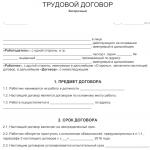1. Learn with interest
Any teacher will confirm: abstract learning of a language is more difficult than mastering a language for a specific purpose. Therefore, at first, learn things that will be useful to you in your work. Another option is to read resources in a foreign language related to yours.
2. Remember only the words you need
There are more than a million words in the English language, but at best a few thousand are used in everyday speech. Therefore, even a modest vocabulary will be enough for you to talk with a foreigner, read online publications, watch news and TV series.
3. Post stickers at home
This is an effective way to expand your vocabulary. Look around the room and see which objects you don't know the names of. Translate the name of each subject into English, French, German - whatever language you want to learn. And put these stickers around the room. New words will gradually be stored in memory, and this will not require any additional effort.
4. Repeat
The technique of spaced repetition allows you to better remember new words and concepts. To do this, review the studied material at certain intervals: first, repeat the learned words often, then return to them after a few days, and after a month, reinforce the material again.
5. Use new technologies
6. Set realistic goals
Be careful with the load and don't overwork yourself. Especially at the beginning, so as not to lose interest. Teachers advise starting small: first learn 50 new words, try to apply them in life, and only then take on the grammar rules.
We decided to learn English language? Of course, you made the right choice, because English language- the main language of international communication.
Most likely, you have already encountered the main problem with learning English- a huge number of textbooks and courses on the market, most of which are a waste of time and money. And if we add to this selfeducation and complete lack of initial knowledge language, then all this confuses a person, and he loses the desire to learn English. A wish- the main key to successfully learning any foreign language.
So, what does the site offer you for success? learning English from scratch?
First of all, especially for the entry level in the form online lessons a wonderful self-instruction manual by K. B. Vasiliev “Easy English” was designed (from the second lesson, the first completely from the site). Lessons on this tutorial are perfect for children, because the texts are presented from popular English children's fairy tales, such as “Alice in Wonderland”, “Winnie the Pooh and Everything Everything”, etc. Additionally, typos and some inaccuracies were corrected, and added free audio for the entire course. And doing the exercises is not at all difficult, because for this there are special forms for entering text, as well as answer keys. To view the answer, hover your mouse over the key: . You can only peek back after you have completely completed the exercise! If you have any questions, you can ask them under the lesson as a comment.
Please note that there is no need to rush and jump to the next lesson immediately after completing the current one. Move on to the next lesson when you are confident that you have mastered the material in the current lesson. fully.
Further parallel With the study of the audio course above, you can also study the perhaps simpler Assimil audio course. The page with audio courses also contains higher-level courses, as well as an interesting tutorial on how to work with audio.
How have you studied so much information and are still confused about verb tenses? Dont be upset, verb tenses in English- this is the most difficult part of it. After all, there are not 3 of them, as in the Russian language, but as many as 12! Especially for easier understanding and assimilation of tenses, the following section on effective lessons by S.P. Dugin for beginners was created.
Verb tenses can also be studied in the English grammar section. Initially, grammar lessons were intended for intermediate students, but translations have been added to them, and now they can be studied by slightly less advanced students. In this section Very There are many lessons, it will help you find answers to many questions, so don't skip it. Proceed to study it only when you are ready. And in lessons for beginners there will periodically be links to specific grammar lessons from this section.
Have you studied all this already? Well, you give it! Congratulations! What to do next? And then you will have even more self-study. Unfortunately, from an intermediate level it is difficult to build any path for study; build it yourself according to your interests. It takes a lot of practice. Listen to a lot of audio and video materials. Try to talk more. No one? Talk to yourself! Read, write. The site also has video materials. Perhaps there will be more later.
Please note that on the mobile version of the site the right menu collapses to the very bottom screen, and the top menu opens by pressing a button ≡ top right.
What kind of English are we learning? British or American?
Correct answer: both.
On the one hand, British refers to pronunciation rules set many years ago. Almost no one speaks it now, but everyone who studies English or tests pronunciation strives for it, incl. American actors (for example, Will Smith). Also, all textbooks have standard grammar and spelling of words. It turns out that almost everyone is learning British English. American grammar and spelling are slightly, very slightly different from British, so look for some textbooks on American English. very, very stupid.
On the other hand, British English also includes a special intonation that almost no one teaches, and it’s difficult to get used to. These lessons also do not teach intonation. It turns out that no matter how hard we try to pronounce it, we will still end up sounding more American English than British. Besides intonation, our speech apparatus is simply more similar to the American one. The video of the 1st lesson presents pure British English. The audio of the following lessons will sound more like American English. Otherwise, English is standard, there is no need to come up with ridiculous reasons why I should or should not learn these particular lessons. Just learn! I am responsible for quality! (Site author)
Surely you found something interesting on this page. Recommend it to a friend! Better yet, place a link to this page on the Internet, VKontakte, blog, forum, etc. For example:
English language learning
The phrase “nowhere without English these days” has become a kind of cliché, but, nevertheless, it is difficult to disagree with it. The modern world, together with its technologies, provides us with a lot of opportunities, but, at the same time, it increases its demands.
A good job now goes not to those who have the best or most expensive education, but to those who have skills that are valuable in practice, not in theory.
One of these skills is, among which English occupies a special place. Yes, knowledge of rare languages is valued more highly, but the demand for such a skill is several times lower than the ability to express oneself in one of the world’s most popular languages.
Is English really that difficult? ? How long will it take?
These are the most common questions among those who are about to take the path of mastering a foreign language. Well. let's figure it out.
Unfortunately (or fortunately), in this article you will not find a miracle recipe that will allow you to learn a language in one day or week. There will be no stories here about how you can learn 200-300 new words a day; you shouldn’t expect unconventional shamanic rituals either.
All new information entering our brain is divided into necessary, potentially necessary, and useless. And one main criterion helps the brain determine the place of new knowledge: the frequency of use of knowledge or skill.
We use our native language every day, so we can’t just forget it. But as soon as we live in another country for several years, we begin to notice that it becomes as if we are formulating sentences, and we have to literally recall words from memory.
There are also words in our native language that we once heard, perhaps even used for some time, but then stopped.
An example would be school terminology in a certain subject. And now, when we hear this or that word or term, we recognize it, but do not use it in our speech.
The same is true with learning any foreign language: it is divided into active, passive, and potential.
 If everything is more or less clear with active and passive vocabulary, then what is the third type?
If everything is more or less clear with active and passive vocabulary, then what is the third type?
A potential dictionary is a set of words that we supposedly don’t know, but we can easily guess their meaning if we are familiar with certain rules.
An example is words that are formed by adding affixes. For example, knowing any and being a little familiar with the topic of participle (participle), we will be able to form new lexical units on our own: read - to read, reading - reading, reading.
Knowing the meaning of the ending –er, we can create names of professions from the verbs we know (work – worker, teach – teacher, swim – swimmer etc.).
There is only one way to develop a solid active reserve - by constantly practicing.
A resource with a lot of materials for listening, grammar tasks, quizzes, and board games.
Users can take tests online or download assignments in pdf format.
A site with many interesting stories to read. completely free.
Do you want to learn English quickly and easily? If you didn't have time to do this in school or didn't have the opportunity, don't despair! You can speak English very quickly with very little effort if you approach learning English the right way.
Coming out of your comfort zone is tough in the beginning, chaotic in the middle, and awesome in the end...because in the end, it shows you a whole new world !!! Make an attempt.
Getting out of your comfort zone is so difficult at first, chaotic in the middle, but how wonderful in the end... Because in the end the whole world will open up in front of you in a new way!!! Just give it a try.
In the modern world, there are many ways to study foreign languages, and sometimes it is not easy for a person to understand this variety of methods, textbooks, schools and approaches. A few simple tips will help you take the first step and choose what’s right for you and stay on track.
You can learn more about the intensive method of learning English from the article
English for dummies from scratch. How to start?
The initial stage in learning English is the most difficult, but you have the most important thing - strength and desire
Where to start learning English?
Learning English from scratch simply won’t work, because you already have a certain amount of knowledge in your head. And this is thanks to the many borrowed words ( information, conflict, comfort), brand names ( Tide- clean, Safeguard- protection, Dove- dove), speaking the names of famous people ( Tina Turner(turner), Nicolas Cage(cell), names of musical groups ( No Doubt(without a doubt), Destiny's Child(child of destiny) Spice Girls(Pepper girls). Not to mention the well-known phrases thank you, hello, yes, ok, wow, which we have been using in Russian colloquial speech for a long time.
Without knowing it, you already speak English words and expressions. And this is the first thing that should inspire you! All that remains is to direct the existing knowledge in the right direction.
How to choose a school and English teacher?
The best option at the initial stage of language acquisition is to find a teacher. As the famous saying goes, a student is not a vessel to be filled, but a torch to be lit. This torch can be lit for you by a teacher, with a twinkle in his eye and a great desire and ability to teach. The most important thing is that it must be a professional in his field .
“You are looking at an unprofessional if, instead of constructing live conversational situations, he forces you to perform tasks at the level of meaning, i.e. just “chasing” you through the textbook. Instead of constantly complimenting you, encouraging communication, he makes comments, rejoices at your every mistake, if he goes to class without original materials (newspapers, magazines, books, radio programs, etc.), and limits himself to textbooks.” Ilya Frank
Russian teacher or native speaker?
And one more wish - first of all, it should be a Russian-speaking teacher. Only he will be able to understand why you made this or that mistake, and will explain complex grammatical phenomena in simple words, the difference between words, comparing them with the Russian language.
However One teacher is not enough to master a language. In your free time from classes, do additional tasks and repeat what you have learned. Anyone who has the desire and interest will definitely do it.
Or it is possible that you have motivation, but for some reason you decided to learn English on your own. Be prepared for the fact that this will require much more time and effort, since you will need to not only complete tasks, but also select and check them yourself! Here, YouTube channels for learning English can help you.
 Group English classes at an offline school are a great way to learn the language and meet new people
Group English classes at an offline school are a great way to learn the language and meet new people
To clearly understand what you need to learn, you need to know its structure. Imagine that words (vocabulary) are musicians, each of them can play individually, their instruments make sounds (phonetics), and in order to organize them into a single orchestra, coordinate them, they need a conductor (grammar).
If the musician doesn’t show up (you don’t know the word), or he comes but plays the wrong notes (pronounce it incorrectly), or the conductor gives the wrong command (break a grammar rule), you won’t get a perfect symphony!
Important!
Vocabulary, grammar, phonetics are the three pillars on which the language rests. Only by studying them together can you master and understand the language and sound beautiful and correct.
Learn English words
Suppose a lost tourist does not know grammar, but he knows individual words - i, search, station, or only one word station. Even if he pronounces it with an accent and not entirely correctly and addresses this word to passers-by, then, most likely, they will understand him. But if he doesn’t know how to speak a station in English, they’re unlikely to help him. Words are your base, constantly expand your vocabulary.
The vocabulary of most native English speakers is 12,000-20,000 words, and in order to communicate in English, it is enough to learn 1,500-2,000 words. And this is not so much, especially if you set yourself a goal of learning 5 words every day.
There are a lot of ways to remember words; long lists of words in textbooks give way to colorful visual dictionaries, video materials on the Internet, where words on a specific topic are presented with their image and pronunciation. Or it could be paper cards that you can buy or make yourself.
 Cards with pictures and translations on the back will help you quickly learn English words.
Cards with pictures and translations on the back will help you quickly learn English words.
Let English words surround you! The method of hanging notes with words around the house has worked well. Hang a note on your door, window, or table with the word for this item, and believe me, very soon you will be naming these items in English.
From the very beginning, create your own dictionary in which you will enter all new words and expressions. And in order to make the results more noticeable and have something to praise yourself for, number the written words, highlight them in different colors depending on how easy or difficult they are for you. Be creative, turn your dictionary into a unique creative masterpiece! See the video below for some ideas on how to design a dictionary.
And most importantly: do not learn everything, but only the essentials. Choose priority topics for yourself, for example, family, food, shopping, travel. Don't try to embrace the immensity. You learn a language all your life!
Having found the desired word in the dictionary, take the time to look through the entire dictionary entry. There are situations when it is better to learn not a single word, but a whole expression, especially if it sounds different in Russian, for example, to get acquainted with, to be afraid of, to catch a cold. Having memorized such phrases as a whole expression, you will remember them ready-made, like one long word.
Don’t forget to repeat the written words from time to time, and then they will be remembered quickly and involuntarily. You can also install mobile applications for learning English words, of which there are quite a lot on the Internet now.
Learn English grammar
Grammar cannot be ignored. No matter how much supporters of alternative and communicative techniques fight against “cramming” grammar rules and boring exercises, grammar rules need to be taught and trained. At the initial stage of study, it will be easier for you to learn a ready-made rule and exceptions than to identify patterns yourself.
However, learning grammar should not become an end in itself. To consolidate the studied grammatical material, combine it with vocabulary. For example, having learned, write a story about your family or work day, having learned the degrees of comparison of adjectives - describe the weather forecast yesterday and today, having studied adverbs of quantity - write a recipe for your favorite dish.
Practice makes perfect
Consolidate the acquired knowledge in practice in all forms: reading, listening, writing, speaking. If you miss even one link from this chain, you risk never overcoming the language barrier.
These should be simple articles and news. Or adapted literature, where intricate constructions that are unnecessary at first are excluded, there are explanations and exercises for reading comprehension. It is convenient to read books in electronic form with an electronic dictionary, because you just need to point to an unfamiliar word and the dictionary will provide you with a translation, which is much easier compared to a paper dictionary.
Learn English by listening
This could be news, podcasts for beginners, stories. From time to time, use the passive listening method, having English spoken in the background. Believe me, the information will be remembered on a subconscious level.
Try to repeat what you hear from native speakers, imitating intonation and pronunciation. You can see an example of intuitive memorization of words by watching the video.
Listen also to English songs, pick up individual words, develop your linguistic intuition. It is especially helpful to start with simple songs where lines or structures are repeated. For example, thanks to the song “All at once” (author Lenka) you will learn to compare:
It’s quite possible for even a beginner to repeat these lines, and by singing them, you practice pronunciation and can transform your speech.
What to watch first?
Find your method to learn English comfortably
 A good start will not make you a fluent speaker. The tongue, like a plant, requires care, water it every day: read, listen, write, speak! And only then will it bear fruit.
A good start will not make you a fluent speaker. The tongue, like a plant, requires care, water it every day: read, listen, write, speak! And only then will it bear fruit.
Find your own path to your goal. Nobody knows you better than yourself. Try to think in English, describe everything that surrounds you. Let them be individual words at first, then phrases, and soon sentences.
French linguist Claude Agége once said: “Of all the languages on the planet, English is the most flexible and most responsive to changing reality.” And it’s true! Every year the English language is replenished with 4,000 new words!
Try teaching English to someone who knows it less well. Yes, you won’t learn anything new, but by explaining it to others, you will better understand and consolidate your knowledge. You can study together with someone (relative, friend, colleague), and compose short dialogues. It’s good if it’s a person who is as eager to master the English language as you are. Perhaps it will be easier for you to figure it out together.
The main thing is to exercise regularly and as often as possible (ideally every day). Your results depend on how systematically you do this. It's like an athlete who needs to stay in shape. This is the only way you will get used to the language. That's right, you need to get used to the language.
Finally:
The initial stage in learning English is the most difficult; it is at this stage that the foundation is laid. You have to overcome the language barrier and believe in yourself or lose the desire to learn the language forever. Remember the simple rules for successfully learning English:
- Find not just a teacher, but a professional in your field; if there is no opportunity or desire, be your own teacher.
- Practice regularly, do not take on new things without repeating what you have learned.
- Train all types of speech activities: listening, speaking, reading, writing. Let the English language into your life, and it will reciprocate your feelings.
- Love what you do so that learning a language becomes a part of your life and brings pleasure. With the right methods and materials it won't be difficult! Good luck!
In contact with
The well-known proverb “The slower you go, the further you will go” is now almost irrelevant in the field of education. It happens that we need some knowledge at a certain moment, but in a week or month it will be of no use. Modern life is fleeting and does not leave much time for additional hobbies.
Learning any language should be carried out on four fronts - reading, writing, listening to speech and speaking practice. Learning English quickly can be difficult - be patient and stubborn.
Start small
There is no need to turn the process of learning a foreign language into a dull chore and doomedly sit down at textbooks. That is, this will also be needed, but, oddly enough, it is important to learn the language by playing and having fun.
First, read. A lot, with gusto and passion. Even if you cannot literally translate every sentence in the book, try to guess its general meaning, and then you can do a literal translation. Start with children's books, as well as those that you have read in Russian and already know their approximate content. By reading, you will increase your vocabulary and get used to the language faster.
Watch movies and TV series in English. The ideal option is with English subtitles and characters speaking clearly and not too quickly. Try to focus all the time on listening to the characters' speech - first familiar words, and then guess the meaning of unfamiliar words.
Find a friend in your circle who knows English and persuade him to practice. If there are none, it doesn’t matter - now there are communities where you can get acquainted and meet in person to practice the language. For example, in Minsk there is an English club that brings together those who want to study and communicate every Monday in the cafe-restaurant “Lido” on the avenue near the Central Department Store. At these tables you can meet people who speak only English, as well as those who speak at intermediate and beginner levels. You can join the company by starting at the “Russian-speaking” table.
Pay attention to English songs that you like. Find the lyrics with translations on the Internet and each time you listen and sing along, remember the meaning and construction of the phrases.
Read slang manuals. This will help avoid various awkward situations when communicating with the local population. Make sure the publication is up to date. Modern active English is presented well and interestingly, for example, by Michael Goldenkov in the publication “Caution! Hot Dog! and the like.The games are over.
The process of learning English will go even faster if you take learning seriously. How to do it?
Visit an English-speaking country and improve your English by communicating with locals. You can travel for short periods of time, but experts insist that the best period for practicing the language is 3 months.
Sign up for courses. Experienced teachers will indicate what exactly should be studied first - what grammar and groups of words, popular topics, etc. You can learn a language at home on the Internet, or attend an educational institution or language school. The learning process with an experienced teacher can be faster.
Self-education. Spend every free minute learning the language. Speak English wherever you can be understood, don’t be afraid to make mistakes - if you make mistakes, they will correct you. Download the application to your mobile phone, or carry the tutorial with you everywhere. Use your English as much as possible. Speaking of smartphone apps, try ANKI, Memrise or Forvo.
Don't spend too much time on grammar. If only because many English speakers do not always speak it correctly. You will improve your grammar by talking to the right people. Don't be afraid to make mistakes, because those who don't try don't make mistakes!Don't try to remember as many words as possible in a row. Better little by little, but every day. With time and practice, the necessary words themselves will ask to be studied. To save words, you can enter them in a special notebook, use a special website or application.




















